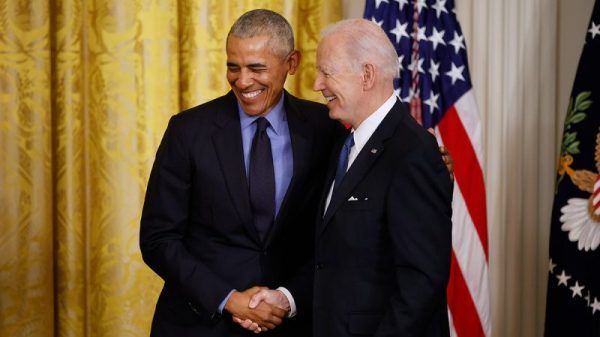Nearly half of Republicans now say the United States is giving too much aid to Ukraine as it fights to repeal Russia’s invading forces, according to a survey published Friday by the Pew Research Center. The finding marks a stark shift from at the outset of the war.
The survey, which also highlights a deep partisan divide on the issue, comes as the Biden administration struggles to convince Congress of the urgency of providing additional money and weapons to Ukraine. Earlier this week, Senate Republicans blocked a procedural vote to advance a national security bill that includes billions of dollars in Ukraine aid because it includes no changes to border security policy.
In the Pew survey of more than 5,000 U.S. adults published Friday, 48 percent of Republicans and Republican-leaning independents say the United States is giving “too much” to Ukraine, compared to 16 percent of Democrats and Democratic-leaning independents who hold that view.
Russia invaded Ukraine on Feb. 24, 2022. A Pew survey published shortly afterward found just 9 percent of Republicans and 5 percent of Democrats said the United States was giving “too much” to Ukraine. Since then, in five Pew surveys, including the latest one, that figure has steadily grown among Republicans but has stayed relatively flat among Democrats.
The latest survey, conducted between Nov. 27 and Dec. 3, shows 20 percent of Republicans and Republican-leaning independents saying the amount the United States is giving is “about right,” compared to 39 percent of Democrats and Democratic-leaning independents who say that. Only 13 percent of Republicans and Republican-leaning independents say it is “not enough,” compared to 24 percent of Democrats and Democratic-leaning independents.
Other recent polling has also shown growing Republican opposition to aiding Ukraine.
A Fox News poll of U.S. voters published last month showed 61 percent of Republicans opposed continuing to provide financial aid to Ukraine while only 35 percent favored doing so. A Quinnipiac poll also published last month found 24 percent of Republicans thought the United States was doing about the right amount to help Ukraine, 60 percent thought the United States was doing too much, and 11 percent thought it is doing too little to help Ukraine.
In late October, President Biden unveiled a $106 billion foreign aid proposal, far larger than even many Democrats had anticipated. It included $61 billion for Ukraine; $14 billion for Israel, which is fighting with Hamas militants in Gaza; $14 billion for immigration priorities; and $10 billion for humanitarian aid, as well as more funding to counter China’s influence in Asian and the developing world.
The White House in recent days has stepped up calls for Congress to pass aid to Ukraine and has found GOP support in key figures like Senate Minority Leader Mitch McConnell (R-Ky.). But McConnell has been at odds with some of his Republican colleagues, particularly in the House, over the scale of aid to Ukraine.
After the procedural vote failed on Wednesday, Senate Majority Leader Charles E. Schumer (D-N.Y.) called it a “very sad day.” He added: “If Ukraine falls, [Russian President Vladimir] Putin will not stop there. He will be emboldened. … This Republican Party must get serious.”
Tying Ukraine aid to border security — an issue on which Congress has failed to take broad-ranging action for decades — has angered some congressional Democrats.
“I can tell you where people are who do not want to see” the latest aid package to Ukraine pass, Secretary of State Antony Blinken said Tuesday at a U.S. Global Leadership Coalition event. “They’re sitting in offices in Beijing, in Moscow and Tehran.”
Republicans have said linking the two issues may be their only way to advance border-security measures, one of their long-held priorities.
Rep. Don Bacon (R-Neb.), a swing-district moderate, said recently that Schumer “has no impetus or no incentive to work on the border. So that’s why it’s going hand in hand.”
Sen. John Cornyn (R-Tex.) told The Washington Post this week that the aid package to Ukraine is “a unique opportunity” for Republicans to get border policy changes.


































